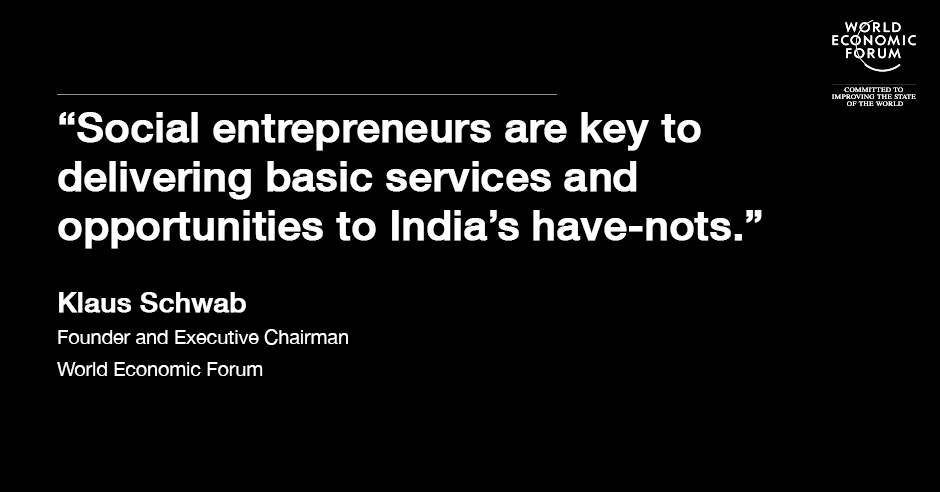Can social entrepreneurs drive inclusive growth in India?

Stay up to date:
Inclusive Growth Framework
Over 60% of the Indian population still live on less than $2 a day. In the World Economic Forum’s Inclusive Growth and Development Report 2015, India is placed second highest in terms of net income inequality among 34 countries in the lower middle-income group.
India has made rapid strides in economic growth, but how can it maintain a healthy rise in GDP and also address inequality among its citizens? This will require structural changes and investment in growth-spurring areas, such as human capital. But it will also require equal opportunities for citizens: access to basic nutrition, education, energy and finance, as well as job and entrepreneurship opportunities.
Social entrepreneurs are key to delivering basic services and opportunities to India’s have-nots. Every year, the Social Entrepreneur of the Year Awards, organized by the Schwab Foundation and the Jubilant Bhartia Foundation, attracts hundreds of social entrepreneurs from all over the country. Some of them employ innovative, cost-efficient and often technology-enabled business models that offer basic services to those who lack access. Others are working hard at removing barriers that prevent access.
These entrepreneurs are not only outstanding in the Indian context, but also on a global level. It’s something we at the Schwab Foundation and World Economic Forum have seen confirmed time and again. Many of these organizations work at an impressive scale – serving millions of low-income households and transforming their quality of life.
One example is Aravind Eye Care System in Southern India, which focuses on curing blindness among India’s poor. The hospital chain has approximately 12,000-15,000 outpatient visits and 1,500 surgeries each day. Another example is Karuna Trust: its public-private partnership model serves more than 2 million low-income clients by transforming government primary healthcare centres into hubs of low-cost, high-quality healthcare delivery. Nidan, meanwhile, has organized close to a million workers in the informal economy across India into collectives and enterprises, secured their access to markets, technology and financial services, and successfully influenced government policy on their social and economic inclusion.
However, seen against the backdrop of social challenges facing the country, their efforts fall short; their impact is often limited to select geographies. How can India build on the wonderful work by these pioneers for social change on a national scale? The answer may not be in identifying more innovations; it may instead be in faster replication and scaling up of social enterprise innovations that we know work. For this, we will need to invest in best practices and capacities, removing barriers to scale, implementing conducive policies and fostering collective action across sectors.
True public-private collaboration is key to making this happen. When designing and implementing policies, the government should draw on the knowledge and experience of social entrepreneurs, ideas and dynamism of its youth, and capabilities of the corporate sector to plan and execute large-scale projects.
India’s young people are critical agents for replicating social enterprise ideas throughout the country – with half of its population under 25 years of age, India has an unrivalled youth demographic.
Beyond their direct reach and impact, social entrepreneurs represent a powerful idea, an idea that is relevant today more than ever before – that business can be a vehicle to create both economic value as well as contribute to building a fair and equitable society. India’s corporate champions have an opportunity to deepen their corporate global citizenship by joining forces with the government and social entrepreneurs in scaling these innovations.
Delivering on India’s inclusive growth agenda calls for multi-pronged interventions. One of them needs to be cultivating and nurturing its innovative social enterprises through public-private cooperation.
Author: Professor Klaus Schwab, Founder and Executive Chairman of the World Economic Forum
Image: A girl studies while sitting on top of a taxi outside her shanty home at a roadside in Mumbai, India, August 11, 2015. REUTERS/Shailesh Andrade
Don't miss any update on this topic
Create a free account and access your personalized content collection with our latest publications and analyses.
License and Republishing
World Economic Forum articles may be republished in accordance with the Creative Commons Attribution-NonCommercial-NoDerivatives 4.0 International Public License, and in accordance with our Terms of Use.
The views expressed in this article are those of the author alone and not the World Economic Forum.
Related topics:
Forum Stories newsletter
Bringing you weekly curated insights and analysis on the global issues that matter.
More on Economic GrowthSee all
Jill Klindt and Mandi McReynolds
May 30, 2025
Sergio Navajas and Jimena Sotelo
May 29, 2025
John Letzing
May 29, 2025
Naala Oleynikova
May 28, 2025






